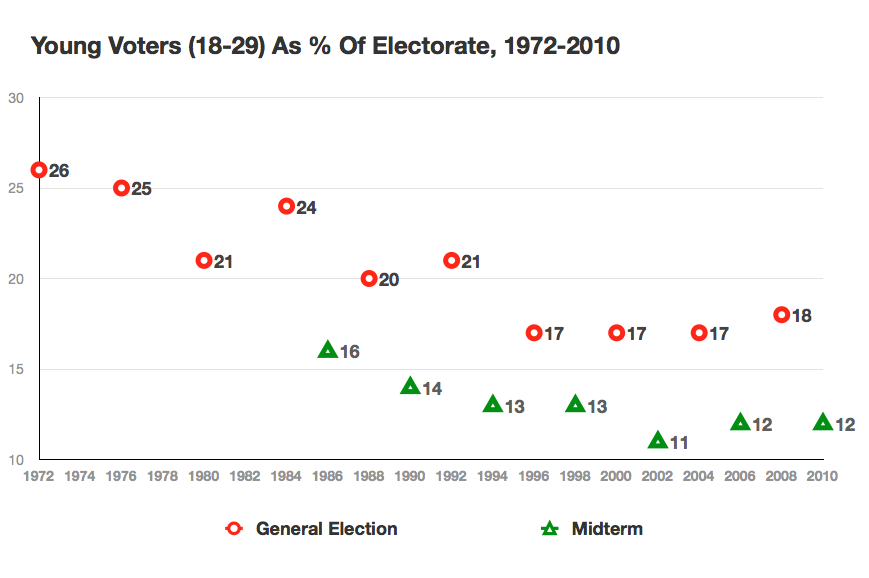
With high unemployment, significant student debt, diminished career prospects and an increase in the number needing to move home with Mom and Dad to make ends meet, young Americans are having a rough go of it these days.
But will this frustration drive young voters to the polls, or will it keep them from turning out? Gallup today suggests young voters are less enthusiastic about this election.
Gallup's findings are interesting but not without problems. They find that in 2004, some 81 percent of young voters said they would "definitely" vote, and in 2008 that number was 78 percent. Today, they find only 58 percent saying they will "definitely" vote, and the gap between young voters and older cohorts is a wide one.
However, they compare voters' self-assessment of their own likelihood to vote in summer 2012 up against how voters felt in October of 2004 and 2008. We can't necessarily divine the meaning of young voters' predictions about their own behavior unless we can compare it to a similar point in a prior election.
Harvard's Institute of Politics conducts a survey twice a year that provides a more useful comparison. In their Spring 2012 survey, they find that only 49 percent of voters 18-29 will "definitely" be voting, and another 15 percent say they will "probably" vote. Among four-year college students, interest is slightly higher, at 53 percent "definitely" voting and 21 percent" probably" voting.
They also have a survey from Spring 2008 of four-year college students that allows us to make a better apples-to-apples comparison. In that survey, some 72 percent said they were "definitely" going to vote, and another 16 percent said they were "probably" going to vote.
Are young voters less excited about this election? Probably. The Harvard data certainly show that at least among college students, the enthusiasm level has fallen from where it was at a similar point in 2008.
Yet young voter turnout has been relatively steady for the last four elections. Despite the high level of enthusiasm that young voters felt in 2008, they did not make up a significantly larger piece of the electorate than in the three prior presidential elections.
Consider the history of American presidential elections since the voting age was lowered to 18. Initially, young voters made up a larger proportion of the electorate. The oldest of the Baby Boomers would have been around 26 years old in the 1972 presidential election, and the size of the Boomer generation combined with the exercise of a newly-granted right to vote for many young people led to an electorate where 26 percent of voters were under 30 that year. (The Census definition of a Baby Boomer is someone born mid-1946 to 1964.)
This chart shows how the under-30 vote has tracked through previous elections. Starting with the Clinton/Dole race in 1996, when all of the Boomers had aged-out of that under-30 bracket, young voters made up 17 percent of the vote in a presidential year, and that number hasn't changed much since.

Surveys are showing less enthusiasm from young voters, but previous elections seem to indicate that the proportion of voters under 30 hasn't bounced around much since 1996. It seems that it would be unlikely that the youth vote in 2012 would drop significantly.
But what will make a much bigger difference in this election is not the proportion of young voters so much as the choice they make when they do enter the voting booth. And how will these voters break? Obama's 34-point margin among young voters in 2008 was an enormous change from prior trends. (Kerry only won young voters by a 9-point margin, and Gore only won them by two points. The widest margin previously had been 19 points, a record shared by Reagan in 1984 and Clinton in 1996.)
The bigger question for the campaigns is not whether or not young voters will turn out but for whom they will turn out. And while young voters may be frustrated and disappointed, neither side should expect young people to stay home this November.